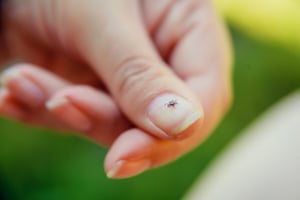Each year, Massachusetts is one of the hardest-hit states in the U.S. when it comes to tick-borne diseases. As winters become milder, people are spending more time outdoors year-round—and ticks are staying active longer, too. But did you know you don’t even have to leave the house to be at risk of tick-borne illness? Mice making themselves comfortable in your Hanover, MA home can spread Lyme disease.
 A tick will feed on many hosts during its lifetime. For young ticks, rodents are convenient prey. Deer mice are often the hosts that pass the Lyme disease bacterium to ticks. As the tick grows, it seeks larger hosts, like deer—or humans.
A tick will feed on many hosts during its lifetime. For young ticks, rodents are convenient prey. Deer mice are often the hosts that pass the Lyme disease bacterium to ticks. As the tick grows, it seeks larger hosts, like deer—or humans.
Even immature ticks can affect a person. As our population grows and our homes expand further into wooded areas and typical tick habitats, we are bound to encounter these arachnids (and the mice they feed on) more often. If a deer mouse enters your home, it could carry with it dozens of Lyme-infected ticks that may detach and choose a person or pet for its next host. Larval ticks are barely the size of a poppy seed, but can still transmit the Lyme disease bacteria to an adult human.
This may not be what you wanted to hear, but it drives home the importance of tick control in southeastern Massachusetts. Whether you’re hiking, cleaning up your yard, or simply lounging on your couch, ticks and the pathogens they carry present a very real threat.
How can Burgess Pest protect your pad from ticks? We offer standalone tick and mosquito plans, as well as the P10+MT program, which offers tick and mosquito control on top of year-round protection from the 10 most common household pests. Even better? An estimate is always free.


